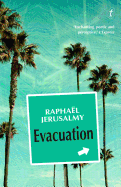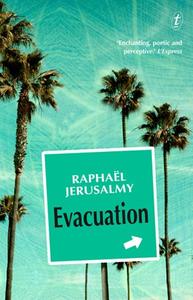
 Conversations in vehicles offer a particular intimacy: occupants have no choice but to be present. In Evacuation, by Raphaël Jerusalmy and translated from the French by Penny Hueston, a car's interior provides the opportunity for a young man to reveal his experiences during an evacuation of Tel Aviv, and for Jerusalmy, a former member of the Israeli military intelligence service, to show people upholding life and art in the midst of warfare.
Conversations in vehicles offer a particular intimacy: occupants have no choice but to be present. In Evacuation, by Raphaël Jerusalmy and translated from the French by Penny Hueston, a car's interior provides the opportunity for a young man to reveal his experiences during an evacuation of Tel Aviv, and for Jerusalmy, a former member of the Israeli military intelligence service, to show people upholding life and art in the midst of warfare.
The novella opens with Naor, an aspiring filmmaker, talking to his mother at the beginning of a drive. His voice serves as the primary narration throughout the book, as it's his story that unfolds. Typical small talk (put on your seatbelt, sorry about that turn) precedes his unexpected comment: "Don't be sad, Mum." With this remark the reader enters the car, too, and listens to Naor, as he drives, explain what happened during a recent military attack on Tel Aviv.
Naor and his girlfriend, Yaël, had planned to accompany Saba, his grandfather, on a bus to the countryside after the mandatory evacuation of the city. At the last minute, Saba gets off the bus and refuses to leave. Naor and Yaël follow him, initially to change his mind, but when he refuses, they decide, in an act of "dissidence," to defy the evacuation orders. Naor himself isn't really sure why the trio defied orders, and attempts to explain their motives to his mother. It's possible, Naor says, that Saba is "playing at being a rebel so people think he's younger." But his mother counters with, "Just like you're playing the rebel so you come across as more mature."
As for Yaël's motivation, she is the most enigmatic of the three. They were cut off from the world, and she "didn't want to surrender to the war." "We were going to behave as if there was no war. As if the war had never happened," Naor struggles to explain. He concludes, "Staying in deserted Tel Aviv was an act of resistance, of hanging on, standing firm." The trio scavenges for food and water, wanders the city reminiscing, and Naor even scripts a film for Yael and Saba to perform. "Have you never done that, pretended you're not part of what's happening around you?" he asks his mother. The reader, too, is lulled into pretending that there isn't a war going on. Thus, when the situation deteriorates, the devastation they experience is all the more shocking for the ordinary routines they'd established.
The politics of the Arab-Israeli war are barely mentioned in the novel. But readers see the street-level view of an aerial attack through Naor's eyes, in contrast to the typical distant perspective seen on news channels. There are people on those streets that are invisible in the larger theater of war. "War is for everyone, civilians as well as the military," Naor says. The trio's refusal to bow to the chaos of war is their ultimate act of resistance. Evacuation is no typical war novel: spare yet compelling, and extraordinarily moving in unexpected places, it challenges those who glance impassively at a televised war to step into the experience of those nearby. --Cindy Pauldine, bookseller, the river's end bookstore, Oswego, N.Y.
Shelf Talker: Three people defy an evacuation order during a military attack in Tel Aviv, leaving them to survive on their own and make choices about what matters in life.

